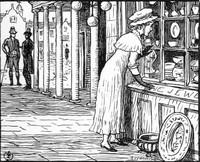|
|
Read this ebook for free! No credit card needed, absolutely nothing to pay.Words: 93024 in 22 pages
This is an ebook sharing website. You can read the uploaded ebooks for free here. No credit cards needed, nothing to pay. If you want to own a digital copy of the ebook, or want to read offline with your favorite ebook-reader, then you can choose to buy and download the ebook.

: The Masques of Ottawa by Bridle Augustus - Statesmen Canada; Canada Biography; Canada Politics and government 1867-@FreeBooksTue 06 Jun, 2023 le of the strange garb in which he turned up at a friend's wedding, even before he was famous enough to be able to do that sort of thing with any degree of contempt for the conventional forms. If Meighen remains Premier of Canada long enough, no doubt some really apocryphal yarns will arise out of these little idiosyncracies, just as legends wove themselves about John A. Macdonald, and Laurier. I remember that the clothes Meighen wore the day I shook hands with him were dingy brown that made him look like a moulting bobolink; that he had not taken the trouble to shave because a sleeping car is such an awkward place for a razor, and it is much better for a Premier to wear bristles than court-plaster. Some one will be sure to remark that the Premier travels in a private car. Arthur Meighen never seems like that sort of Premier. One would almost expect him to choose an upper berth because some less lean and agile person might need the lower. We were told by cable that the Premier took part in most of the sports on board ship, and of course lost most of the events. Well, there is no harm in a Premier beginning to be whimsically athletic near fifty. But, unless now and then he could manage to win something it was obviously only an attempt to make him interesting to the cables, on the principle that a polar bear is prodded in a cage to make him perform for the "lidy". Weeks before he went the Premier foreshadowed the attitude he would take at the Conference. Again and again it was repeated as he slowly left the country, even pausing at Quebec to say it again; and thereafter the cables took it up, repeating it over and over, until the people of Canada began to suspect that the correspondents were almost as hard up for news as some of them were during the war. Mr. Grattan O'Leary knew he had a difficult character to popularize on the cable; a man who until he became Premier, outside of Parliament was as diffident as the hero in "She Stoops to Conquer"; at High School in the little stone town of St. Mary's, Ont., so studious that he never could catch a baseball that wanted to drop into his pocket; at college immersed in mathematics, at Osgoode in law; as a young man opening a forlorn office in Portage, still a sort of lariat town, when Meighen was shy of even a family saddle-horse. In Portage Meighen lived in a weather-boarded frame house, during the time when in bigger Western towns other politicians were putting up little palaces, causing their electoral enemies to wonder where they got the money. In Ottawa when he became Premier he lived in one of the plainest houses, with no decorative fads, no celebrated pictures, not much music, but plenty of room for the juveniles; described by a political writer who was there the evening of the appointment as "just comfortable." He was at home that evening, discussing simply a number of public matters, but not a word about the Premiership, till as the visitor was rising to go and said, "Oh, by the way--permit me to congratulate you," Meighen broke into his bewildered smile and said bluntly, "Thanks!" He was not outwardly impressed by the least impressive Premiership that ever happened. The nation had nothing to do with it. Meighen had not been elected. He had drafted no platform before he became Premier. He did it afterwards. All that happened was a change of captains on a ship. Meighen had been spiritual adviser to Borden in other remakings of his Cabinet. This time he was not consulted. Sir Robert never had such a predicament. In the words of the old song, "There were three crows sat on a tree." The names of the crows were--White, Meighen, Rowell. Their common name was Barkis. Which should it be? White echoed--Which? So did they all. Great affairs are sometimes so childlike. Meighen was willing to accept White as Premier. White had been for years in the spotlight. Did he hope, or expect, that Sir Thomas would refuse? We are not told. But he must have surmised. In any case White was off the ship. The choice came down to two. Here again it was a spotlight man--or Meighen. Rowell had become famous when Meighen had not; but he was a converted Liberal, and of only three years' experience. The necessity was obvious. Sir Thomas, declining the leadership, must have recommended Meighen, much to the Premier's joy. Yes, it was time for a leader. Mr. Rowell was out--and off the ship. Happily there were no more crows on the tree, or Meighen would have been forced to hold an election in order to get a Cabinet. However, the three of them consented to remain in the crew, until further notice. Thus much was settled. Meighen should lead,--but what? As yet little more than a hyphenated and quite stupid name, which had never yet resolved itself into a platform. But the name and the platform were both as clear as the constitution of the party, in which, under the political microscope, there was clearly discernible a Unionist Centre, a Tory Right and a Liberal left. "Lacks solidarity," mutters Meighen. "Looks like tick-tack-toe. But wait." The third disturbing feature was the condition of the country. From his wheel-house Meighen could see many clouds. The Reds, whom he had ruthlessly handled in the Winnipeg Strike; the rather pink-looking Agrarians; the Drury Lane coalition of farmers and labourites in Ontario; Quebec almost solid Liberal behind Lapointe; Liberals angling for alliance with Agrarians; Lenin poisoning the Empire wells of India with Bolshevism; League of Nations every now and then sending out an S.O.S., interrupted in transit by Lord Cecil or Sir Herbert Ames; and--not least threatening of storms but if properly negotiated favourable to this country on the Pacific issue--Mr. Harding busy on a "just-as-good" substitute for the League of Nations with Washington as a new-world centre when Mr. Meighen had hitherto neglected to advocate a Canadian envoy to that Capital. Having scanned all these weather signals, Mr. Meighen decided that diplomacy for the present was dangerous and that boldness was better. In his programme speech at Stirling he divided the nation into two groups--that of authority and order to which he belonged, and the heterogeneous group of incipient anarchism to which belonged all those who did not agree with him. Free books android app tbrJar TBR JAR Read Free books online gutenberg More posts by @FreeBooks
: Notes and Queries Number 179 April 2 1853. A Medium of Inter-communication for Literary Men Artists Antiquaries Genealogists etc. by Various Bell George Editor - Questions and answers Periodicals Notes and Queries@FreeBooksTue 06 Jun, 2023
|
Terms of Use Stock Market News! © gutenberg.org.in2025 All Rights reserved.






